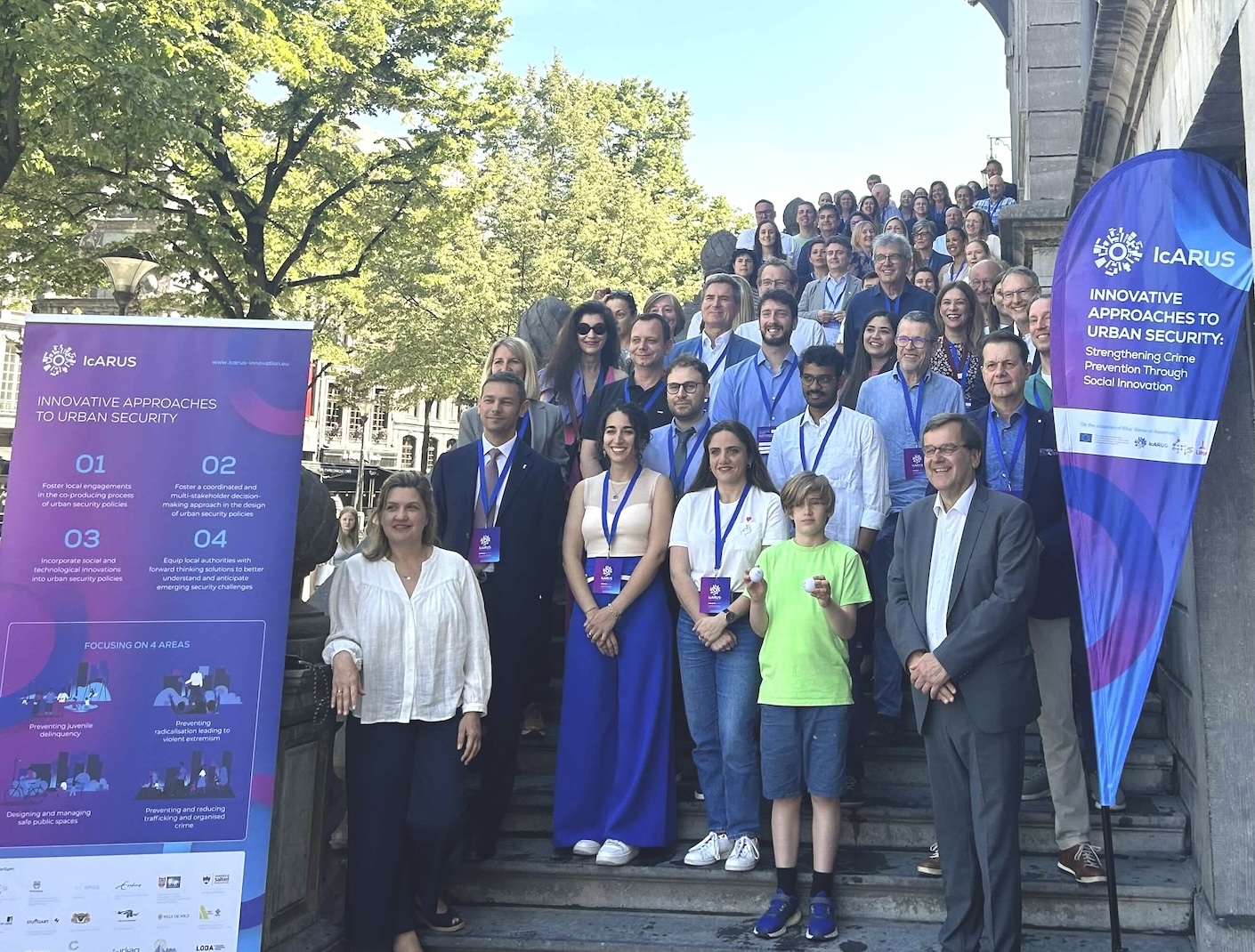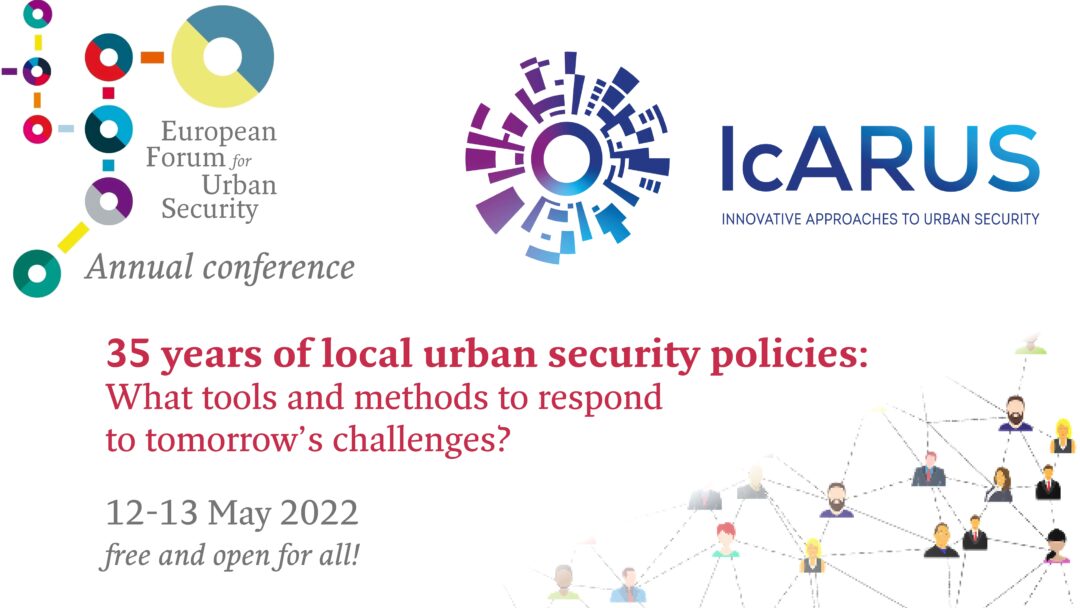Launched in 2020 with the aim of helping local urban security actors to anticipate and better respond to problems by analysing and revamping their working methods and tools, Efus’ IcARUS project is concluding in August 2024. A look back on four years of intense work that combined research and innovative practices.
Paris, France, July 2024 – European local and regional authorities are confronted with multiple challenges in terms of urban security. Even though overall crime rates have dropped in Europe since the mid-1980s,* a significant proportion of the population still feels insecure, and new forms of crime and public order problems have emerged such as cybercrime or polarisation that can lead to violent extremism.
On the other hand, governments throughout Europe have been struggling with public debt and considerably reduced budgets allocated to local levels of governance while at the same time loading them with increasing responsibilities.
The European Forum for Urban Security (Efus) has seen first-hand how these trends have been and are affecting its 250 or so member cities.
Building on 30+ years of local practice
How can we build on our 30+ years of crime prevention practices and accumulated knowledge and help European local and regional authorities and their local partners better respond to urban security challenges, but also anticipate them? This was basically the question Efus sought to answer to when it designed the IcARUS project back in 2020.
After obtaining funding from the European Union’s Horizon 2020 research programme, Efus thus set out on a project that lasted four years and is concluding in August 2024 after a final conference held in Liège (Belgium) in late June.
An EU representative, Marta Cygan, Director for Innovation & Audit at the European Commission’s Directorate General for Migration and Home Affairs, stressed during the conference that “the IcARUS project is aligned closely with the urban security objectives of the Commission and the European Union, which are to ensure the protection of citizens and their fundamental rights.” What was particularly interesting in this project, she added, was that it associated six partner cities that can be considered as “small labs of life in a community where research on practice can be applied to test different solutions.”

A human-centred methodology focused on end-users
In order to properly research the knowledge accumulated over three decades of local crime prevention practices and exchanges among European cities and come up with innovative solutions, Efus set up a wide-ranging consortium that included six cities (Lisbon, Nice, Riga, Rotterdam Stuttgart and Turin), six universities and research institutes, and three civil society and private sector organisations.**
The IcARUS partners decided from the onset on a methodology they would adapt and test throughout the project: Design Thinking, which is widely used in the private sector to design new products and services and whose core principle is to approach issues from the perspective of users. It is the first time this methodology has been used in the field of crime prevention and security.
Four work areas
They also decided to focus their work on four areas that are of major concern to European local and regional authorities and crime prevention actors: the prevention of juvenile delinquency; the prevention of radicalisation leading to violent extremism; the protection and management of public spaces, and the prevention of and fight against trafficking and organised crime. All four are also priorities in the European Union’s Security Agenda.
“One of the main benefits of the project was to share collaborative resources and knowledge between academics, practitioners and stakeholders, but also citizens.”
Adam Crawford, University of York and University of Leeds
Six cities, six prevention tools
One of the objectives was to anchor the project on real-life practice, hence the idea of associating six European cities that could bring their on-the-ground experience and knowledge. As the end-users of the project, they were invited to contribute by designing, together with the partner universities, a tailored prevention programme that would help them tackle an issue they deemed a priority.
This was a long process that took a lot of toing and froing between the cities and the other partners over the duration of the project, including two dozen workshops and training sessions. In the end, each set up a scheme, or adapted an existing one, which they presented to the 100 or so attendees at the final conference in Liège.
It would be too long here to detail each of these projects, which are all being implemented in real life, but here is a short description (a detailed presentation is available on the IcARUS website, see below):
- Lisbon focused on the prevention of juvenile delinquency with Jovem Design Lisboa (JDL), which seeks to involve young people in the safety of their community, improve their relations with local police, and strengthen their life skills.
- Nice decided to adapt the Ask for Angela (Demandez Angela) scheme whereby participating hospitality venues (bars, hotels, restaurants) and shops pledge to offer refuge and support to victims of harassment in the street, whatever their gender.
- Riga created a programme called Par drošu Rīgu! (For a safe Riga) that enables local police to base its tactics on police records and citizens’ feelings of (in)security.
- Rotterdam wanted to involve the users, mainly private businesses, of the vast industrial park located near the port to improve security and prevent infiltration from organised crime. It used the World Café methodology to set up the Spaanse Polder Café where growing numbers of locals meet regularly.
- Stuttgart chose to raise awareness among young people about the dangers of radicalisation, especially on social media, and to build their resilience. It created a travelling magic show that can be performed in different kinds of places (commercial malls, public squares, etc.). The audience is shown the tricks that radical/extremist movements use to woo new recruits.
- Turin chose (like Lisbon) to focus on the prevention of juvenile delinquency. It set up Sbocciamo Torino (Let Turin blossom), which is a network of practitioners and other prevention actors. Together, they work to design interventions in Turin’s neighbourhoods, aided by a visual digital dashboard presenting relevant data.
What impact?
Speaking at the conference, Adam Crawford, Professor in Criminology & Criminal Justice at the University of York and the University of Leeds (UK) and one of the project’s partners, drew some takeaways:
“We’ve been on a journey for four years that was very productive. I would point out three main benefits and three main challenges:
– The first benefit is about the collaborative resources and knowledge between academics, practitioners, stakeholders, but also citizens.
– The second one is about experimentation: doing something new, pushing the boundaries.
– The third one is about organisational learning, when organisations are often not very good at learning.
– The first challenge is re-inventing the wheel as opposed to doing the same as everybody else.
– The second one concerns time horizons. Practitioners are about the now, whereas researchers know that learning and innovation take time. We need both attending to the here and now and foresight.
– The third one is that organisations tend to be risk averse, in particular in the law enforcement and security field where doing things wrong can have serious consequences. However, we must escape from the enclosure of ‘it has to succeed.’”
Now what?
The IcARUS project is now concluded, but it’s far from having ended. Local authorities, practitioners and researchers can benefit from its wealth of findings and insights (see below for links to some of the project’s resources). Now, Efus, together with the IcARUS partners, intends to further the work carried out over four years to tailor its offer of support to its member local and regional authorities across Europe.
As such, Efus will build on the project’s results and evaluation to fine-tune its services to European local and regional authorities, which range from local safety audits and state-of-the-art reviews to the benchmarking of practices, peer-to-peer learning, customised strategic guidance, pilot testing, evaluation and knowledge management (notably through training), and exploring networking opportunities with the private sector, civil society and the research community.
* The research conducted in the IcARUS project shows that prevention played a significant role in the decrease in aggregate crime rates in relation to traditional property and public crimes. However, it also shows that despite its ‘success’, crime prevention remains under-resourced and poorly implemented.
** The IcARUS consortium : Project Coordinator: Efus – Local authorities: city of Lisbon (PT), city of Nice (FR), city of Riga (LV), city of Rotterdam (NL), city of Stuttgart (DE), and city of Turin (IT) – Universities and research partners: Salzburg University of Applied Sciences (AT); Erasmus University of Rotterdam (NL); Panteion University (GR); University of Salford (UK); University of Leeds (UK); IDIAP Research Institute (CH); KEMEA (GR) – Civil society and private sector organisations: Plus Ethics (ES), Makesense (FR), Camino (DE) – Dissemination and communication: Loba (PT)
> Read The Changing Face of Urban Security: A Review of Accumulated Learning conducted by the University of Leeds
> The main results from the IcARUS research are here
> A brief presentation of each of six projects developed by the partner cities is available here
> Explore the IcARUS website for more articles, factsheets and research documents
> More information on Efus’ website / IcARUS section



